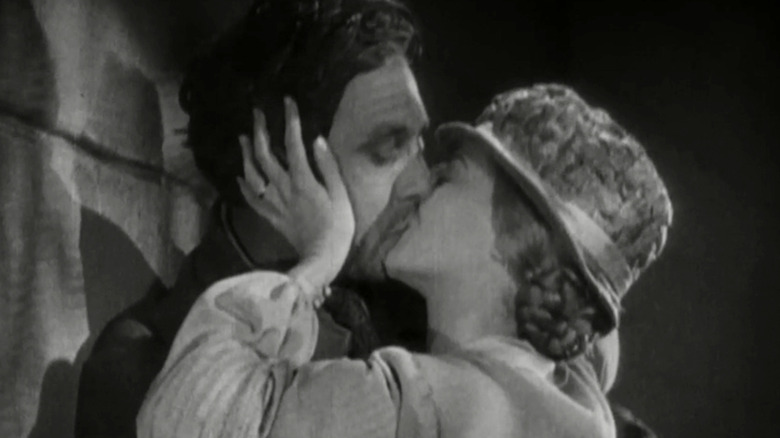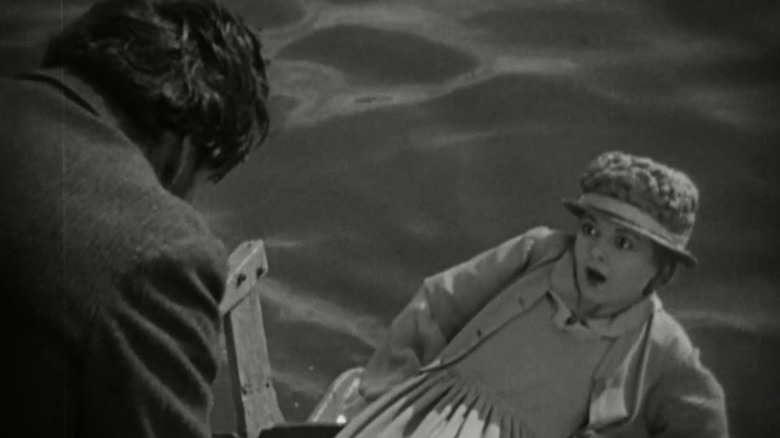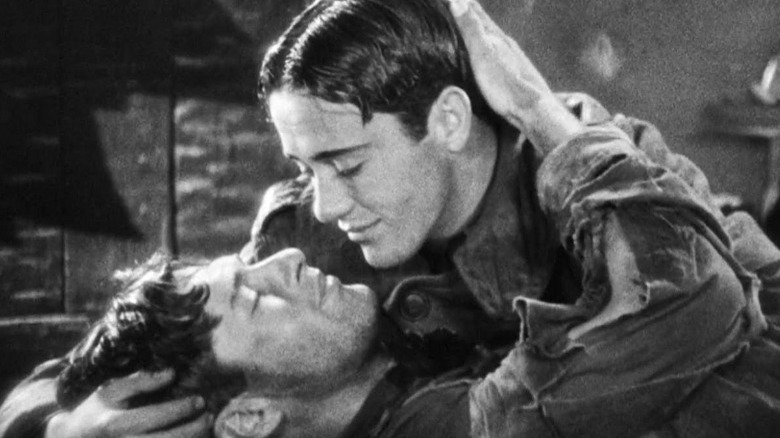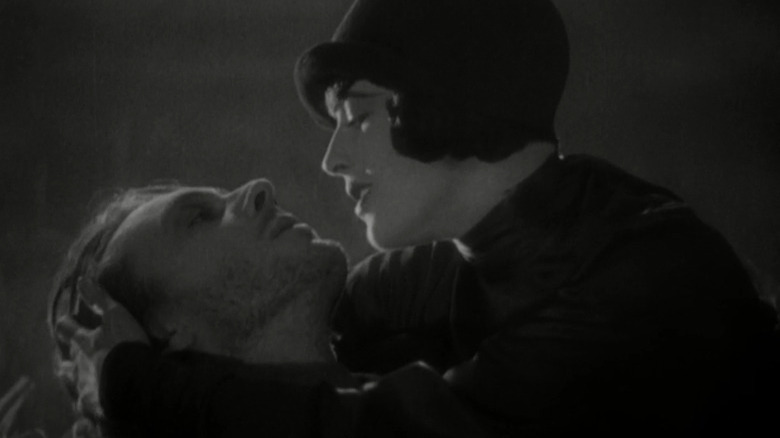Sunrise Is The Only Best Picture Oscar Winner The Academy Doesn't Recognize
The Academy of Motion Picture Arts and Sciences (AMPAS) has, ever since 1927, been giving out awards to the best movies, directors, actors, and other artisans throughout the industry. Or at least, they've been giving awards to the ones that can win an annual popularity contest.
Say what you will about the Oscars and their credibility — they were, after all, invented to bust unions, not celebrate the art of cinema — but for nearly 100 years they have done a great job of raising the visibility of motion pictures which, on a long enough timeline, were otherwise destined to fade into obscurity. For every "Casablanca" or "Titanic," blockbuster films that have seemingly permanently invaded the public consciousness, there's a "Cavalcade" or a "The Greatest Show on Earth," which haven't made nearly as much of a cultural footprint, and which are more likely to be seen by modern audiences specifically because they won the Best Picture Oscar, and are highlighted in the history books.
But there's one Best Picture winner that the history books treat differently than all the others. Nowadays it isn't even considered a "Best Picture" winner at all, even though it's widely considered to be one of the best motion pictures ever made.
Let's talk about "Sunrise: A Song of Two Humans," the other first Best Picture.
Unique AND artistic
The very first Academy Awards ceremony was held in 1929 at the Hollywood Roosevelt Hotel, and it was an extremely different affair. The winners had already been announced, the ceremony lasted only 15 minutes, it wasn't broadcast in any medium, and the categories were extremely different than what fans of the Oscars are used to.
The winners for Best Actor and Actress, Emil Jennings and Janet Gaynor, received Academy Awards for their work in multiple films, not just a single performance. There were no awards yet for Best Supporting Actor or Supporting Actress. The awards for Best Director were split by genre, with Lewis Milestone winning for Best Directing of a Comedy Picture and Frank Borzage winning for Best Directing of a Dramatic Picture.
But even more significantly, the award for Best Picture was also split, and not by genre. There was the Academy Award for Outstanding Picture, which went to the World War I epic "Wings," and the Academy Award for Unique and Artistic Picture, which went to the experimental drama "Sunrise: A Song of Two Humans." Essentially,"Wings" was deemed to be the most crowd-pleasing movie of the year, while "Sunrise" was declared the most interesting. There were two "Best Pictures."
Just one year later the Academy dropped the Academy Award for Unique and Artistic Picture, shifting all the focus onto the Academy Award for Outstanding Picture. That's all well and good, but the Academy also decided that "Wings" was now officially the first Best Picture winner, and that "Sunrise" — even though it also won a Best Picture award — didn't count anymore. The official Oscars website still claims that "Wings" was the "first Best Picture winner," a dramatic oversimplification that effectively sweeps the other "first Best Picture" under the rug.
A song of two Best Picture winners
Not every Best Picture winner withstands the test of time; try watching "The Broadway Melody" or "Crash" and you'll see what we mean. But funnily enough, the first Best Picture winners are both excellent films that have lost none of their power. Even some of the nominees they beat out, especially the pulpy and imaginatively filmed gangster picture "The Racket," still pack a punch.
William A. Wellman's "Wings" tells the story of romantic rivals Jack (Charles Rogers) and David (Richard Arlen), who are both in love with the same woman and both enlist to become aviators in World War I. Meanwhile, Jack's best friend Mary (Clara Bow) — who is in love with him, although Jack doesn't realize it — joins the war effort as a nurse. Jack and David develop a very close friendship over the course of the war, culminating in tragedy, and a powerful kiss. It's an impressive epic with daredevil flying sequences and a brief but memorable early role for a young Gary Cooper.
F.W. Murnau's "Sunrise: A Song of Two Humans" tells a much darker, more intimate tale of a farmer (George O'Brien) who cheats on his wife (Janet Gaynor) with a visiting woman from the city (Margaret Livingston). She tempts the farmer to murder his wife, but when his wife flees from him they wind up in the big city, reconciling and realizing they still love each other. Murnau was a master stylist whose horror classic "Nosferatu" is one of the most influential films in history (even if the Academy rarely recognizes its genre), and although the story in "Sunrise" is bizarre in a very different way, the filmmaking is still ecstatically inventive and ambitious. The film is impressive to this day.
There are no losers
"Wings" may be the film the Academy considers the "first" Best Picture winner, but that's a serious rewrite of a more complicated history. "Sunrise: A Song of Two Humans" is more than just an asterisk, it's a film the Academy Awards celebrated as highly as any other. It's not the film's fault that the awards got streamlined one year later.
Fortunately, both movies would go on to have a formidable legacy. "Wings" is still the only completely silent Best Picture winner in history, since "Sunrise" utilized synchronized sound for its music and effects (even though the film has no audible dialogue). Wellman's film would go on to influence future war epics, even inspiring shots and sequences in modern blockbusters like "Star Wars: The Last Jedi."
While F.W. Murnau's film wouldn't have quite the same imprint on popular culture, "Sunrise: A Song of Two Humans" is still considered one of the best motion pictures ever produced. In the 2022 Sight and Sound poll, 1,639 critics ranked "Sunrise" as the 11th greatest movie ever made. And since "Sunrise" eked out "The Godfather," which came in at #12, that also makes "Sunrise" (technically) the highest-ranked Best Picture winner on that list.
Maybe it's time the Academy Awards gave it the proper recognition too.



